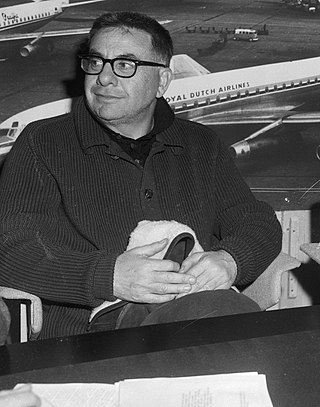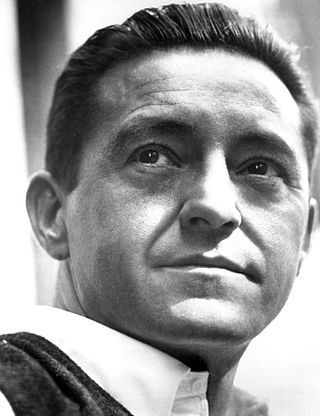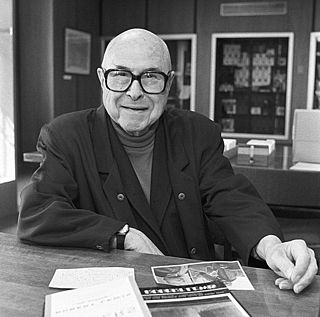This article needs additional citations for verification .(October 2009) |
Louis Lacy Clinton Kimbrough [1] (born March 8, 1933) is an actor from the United States.
This article needs additional citations for verification .(October 2009) |
Louis Lacy Clinton Kimbrough [1] (born March 8, 1933) is an actor from the United States.
Kimbrough was born in Oklahoma City, to parents Fred and Lucinda (Yoakum) Kimbrough. After his birth, his family moved to Allen, Oklahoma, where Kimbrough attended Allen High School (AHS), graduating in 1951.
Kimbrough demonstrated theatrical ability while still at school. In 1948, as President of Allen's Teen Town, he helped produce the "Gay Nineties Ball". [2] As a junior at AHS, he wrote, produced and directed the 1950 senior play, a full-length production entitled Broadway. After graduating from AHS, Kimbrough enrolled for a year at Oklahoma University. [3]
He then completed two years in the US Signal Corps, stationed in Korea, before he made his professional stage debut in Brandon Thomas's play Charley's Aunt in 1953 aged 20, billed as "Lewis Clinton Kimbrough". [3]
He subsequently enrolled in the American Academy of Dramatic Arts in New York. Shortly thereafter, with the help of fellow Oklahoman Lonny Chapman, Kimbrough joined Lee Strasberg's Actors Studio, an incubator for acting talent. Kimbrough gained a reputation for his ability to understand the character he was asked to play. [4] His work with The Actors Studio resulted in his first film role, The Strange One, which used a cast and crew entirely of Actors Studio personnel. An appearance in A Face in the Crowd followed, and Kimbrough established a working relationship with director Elia Kazan that lasted ten years.[ citation needed ]
Kimbrough appeared in an 11-month Broadway run of Thornton Wilder's Our Town , directed by José Quintero. During the 1960s, Kimbrough worked in the theater and on Broadway, performing the works of Shakespeare, Arthur Miller, Neil Simon, Eugene O'Neill and Tennessee Williams.
In the late 1950s, Kimbrough appeared on live television on numerous occasions, including weekly shows such as Westinghouse Studio One , G.E. Theater and U.S. Steel Hour . He was in an NBC TV production of Our Town, again directed by José Quintero.
Kimbrough had a feature role in Hal B. Wallis's 1958 Hot Spell . He moved from New York to Hollywood in the late 1960s and developed an association with Roger Corman, known as "King of the B Movies", with roles in several 1970s film productions, such as Von Richthofen and Brown , Bloody Mama , Crazy Mama and the Nurse movies. [5]
Kimbrough was at one time married to Frances Doel, writer of Crazy Mama .[ citation needed ]
Since 2007, a film festival has taken place in Allen, Oklahoma during the annual Alumni Weekend in June, aiming to acquaint the public with Kimbrough's career and work.[ citation needed ]

Anthony George Franciosa was an American actor most often billed as Tony Franciosa at the height of his career. He began his career on stage and made a breakthrough portraying the brother of the drug addict in the play A Hatful of Rain, which earned him a nomination for the Tony Award for Best Featured Actor in a Play. He reprised his role in its subsequent film adaptation, for which he won the 1957 Venice Film Festival Award for Best Actor, and was nominated for the Academy Award for Best Actor in a Leading Role.

Clifford Odets was an American playwright, screenwriter, and actor. In the mid-1930s, he was widely seen as the potential successor to Nobel Prize–winning playwright Eugene O'Neill, as O'Neill began to withdraw from Broadway's commercial pressures and increasing critical backlash. From January 1935, Odets's socially relevant dramas were extremely influential, particularly for the remainder of the Great Depression. His works inspired the next several generations of playwrights, including Arthur Miller, Paddy Chayefsky, Neil Simon, and David Mamet. After the production of his play Clash by Night in the 1941–42 season, Odets focused his energies primarily on film projects, remaining in Hollywood until mid-1948. He returned to New York for five and a half years, during which time he produced three more Broadway plays, only one of which was a success. His prominence was eventually eclipsed by Miller, Tennessee Williams, and, in the early- to mid-1950s, William Inge.

The Group Theatre was a theater collective based in New York City and formed in 1931 by Harold Clurman, Cheryl Crawford and Lee Strasberg. It was intended as a base for the kind of theatre they and their colleagues believed in—a forceful, naturalistic and highly disciplined artistry. They were pioneers of what would become an "American acting technique", derived from the teachings of Konstantin Stanislavski, but pushed beyond them as well. The company included actors, directors, playwrights, and producers. The name "Group" came from the idea of the actors as a pure ensemble; a reference to the company as "our group" led them to "accept the inevitable and call their company The Group Theatre."

Martin Ritt was an American director, producer, and actor, active in film, theatre and television. He was known mainly as an auteur of socially-conscious dramas and literary adaptations, described by Stanley Kauffmann as "one of the most underrated American directors, superbly competent and quietly imaginative."

Martin Henry Balsam was an American actor. He had a prolific career in character roles in film, in theatre, and on television. An early member of the Actors Studio, he began his career on the New York stage, winning a Tony Award for Best Actor in a Play for Robert Anderson's You Know I Can't Hear You When the Water's Running (1968). He won the Academy Award for Best Supporting Actor for his performance in A Thousand Clowns (1965).

Mildred Dorothy Dunnock was an American stage and screen actress. She was nominated twice for an Academy Award for her works in Death of a Salesman (1951) and Baby Doll (1956).

Luther Adler was an American actor who worked in theatre, film, television, and directed plays on Broadway.

NBC Studios are located in the historic 30 Rockefeller Plaza in Manhattan, New York City. The building houses the NBC television network headquarters, its parent NBCUniversal, and NBC's flagship station WNBC, as well as cable news channel MSNBC.

Edward Binns was an American actor. He had a wide-spanning career in film and television, often portraying competent, hard working and purposeful characters in his various roles. He is best known for his work in such acclaimed films as 12 Angry Men (1957), North by Northwest (1959), Judgment at Nuremberg (1961), Fail Safe (1964), The Americanization of Emily (1964), Patton (1970) and The Verdict (1982).

Austin Campbell Pendleton is an American actor, playwright, theatre director, and instructor.

Robert Lewis was an American actor, director, teacher, author and founder of the influential Actors Studio in New York in 1947.

Regina Taylor is an American actress and playwright. She has won several awards throughout her career, including a Golden Globe Award and NAACP Image Award. In July 2017, Taylor was announced as the new Denzel Washington Endowed Chair in Theater at Fordham University.

The Vivian Beaumont Theater is a Broadway theater in the Lincoln Center complex at 150 West 65th Street on the Upper West Side of Manhattan in New York City. Operated by the nonprofit Lincoln Center Theater (LCT), the Beaumont is the only Broadway theater outside the Theater District near Times Square. Named after heiress and actress Vivian Beaumont Allen, the theater was one of the last structures designed by modernist architect Eero Saarinen. The theater shares a building with the New York Public Library for the Performing Arts and contains two off-Broadway venues, the Mitzi E. Newhouse Theater and the Claire Tow Theater.
Paul Osborn was an American playwright and screenwriter. Osborn's original plays are The Vinegar Tree, Oliver Oliver, and Morning's at Seven and among his several successful adaptations, On Borrowed Time has proved particularly popular. He wrote the screenplays for East of Eden (1955) and South Pacific (1958), among other films.

Geoffrey Horne is an American actor, director, and acting coach at the Lee Strasberg Theatre and Film Institute. His film and television credits include The Bridge on the River Kwai, Bonjour Tristesse, The Strange One, Two People, The Twilight Zone, and The Outer Limits.

Jakob Garfein was an American film and theatre director, acting teacher, and a key figure of the Actors Studio.

Molly Day Kazan was an American dramatist and the first wife of influential film director Elia Kazan.

Michael Strong was an American stage, film and television actor.
The Actor's Workshop was a theatre company founded in San Francisco in 1952. It was the first professional theatre on the west coast to premiere many of the modern American classics such as Arthur Miller's Death of a Salesman and The Crucible, and the world dramas of Samuel Beckett, Bertolt Brecht, Jean Genet and Harold Pinter. For the 1953–1954 season, the Workshop offered six plays: Lysistrata, by Aristophanes; Venus Observed, by Christopher Fry; Death of a Salesman, by Arthur Miller; a revival of Playboy; The Cherry Orchard, by Anton Chekhov; and Tonight at 8.30, by Noël Coward. On April 15, 1955, the Actor's Workshop signed the first Off-Broadway Equity contract to be awarded outside New York City.
Michael O'Sullivan was an American actor, "larger than life," who appeared on Broadway, at Lincoln Center, on the London stage, at San Francisco's Actor's Workshop and in many regional theaters and festivals of America throughout his brief career in the late 1950s and '60s.